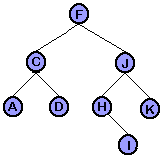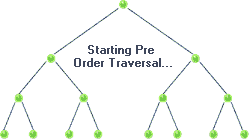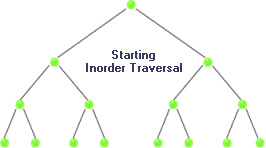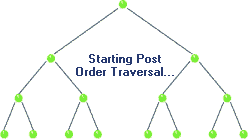2.2 Traversing a Binary Tree
Traversing A Binary TreeTraversing a binary tree comes in handy when you would like to do a print out of all the data elements in the tree. We demonstrate three types of traversals in our tutorial. All traversal descriptions refer to:
 Figure 1.1: Sorted Binary Tree These three types are as follows: Pre order traversal:A pre order traversal prints the contents of a sorted tree, in pre order. In other words, the contents of the root node are printed first, followed by left subtree and finally the right subtree. So in Figure 1.1, an in order traversal would result in the following string: FCADJHIK. |
PreOrder (T)
If T < > Null
then print (T.data)
else print(‘empty tree’)
If T.lp < > null
then PreOrder(T.lp)
If T.rp < > null
then preorder (T.rp)
end.
|

|
In order traversal:An in order traversal prints the contents of a sorted tree, in order. In other words, the lowest in value first, and then increasing in value as it traverses the tree. The order of a traversal would be 'a' to 'z' if the tree uses strings or characters, and would be increasing numerically from 0 if the tree contains numerical values. So in Figure 1.1, an in order traversal would result in the following string: ACDFHIJK. |
InOrder (T)
If T < > null
print (‘empty tree’)
If T.lp < > null
then InOrder(T.lp)
print (T.data)
If T.rp < > null
then InOrder (T.lp)
end.
|

|
Post order traversal:A post order traversal prints the contents of a sorted tree, in post order. In other words, the contents of the left subtree are printed first, followed by right subtree and finally the root node. So in Figure 1.1, an in order traversal would result in the following string: ADCIHKJF. |
PostOrder (T)
If T = null
then print (‘empty tree’)
If T.lp < > null
then PostOrder(T.lp)
If T.rp < > null
then PostOrder(T.lp)
Print(T.data)
end.
|

|
|
If the word right is replaced by left and vice versa in the above definitions the result is called the Converse of the definition. (I.e. ConversePreOrder – Process the root, the right subtree and then the left subtree) |
[an error occurred while processing this directive]